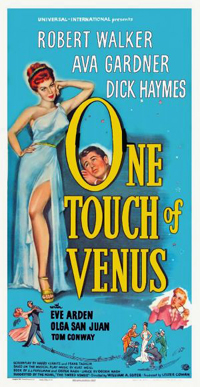This article relies largely or entirely on a single source .(March 2025) |
| One Touch of Venus | |
|---|---|
 Theatrical release poster | |
| Directed by | William A. Seiter |
| Screenplay by | Harry Kurnitz Frank Tashlin |
| Produced by | William A. Seiter Lester Cowan John Beck (associate) |
| Starring | Robert Walker Ava Gardner Dick Haymes |
| Cinematography | Franz Planer |
| Edited by | Otto Ludwig |
| Music by | Ann Ronell Kurt Weill |
Production company | Artists Alliance |
| Distributed by | Universal Pictures |
Release dates |
|
Running time | 82 minutes |
| Country | United States |
| Language | English |
One Touch of Venus is a 1948 American black-and-white romantic musical comedy film starring Robert Walker, Ava Gardner, Dick Haymes, and Eve Arden. Directed by William A. Seiter, the Universal-International release was based on the 1943 Broadway musical of the same name, book written by S. J. Perelman and Ogden Nash, with music composed by Kurt Weill (lyrics by Nash). However, the film omits most of Weill's music. The actors did their own singing, except for Ava Gardner (Venus) whose singing was dubbed by Eileen Wilson. The plot is from an original 1885 novella by Thomas Anstey Guthrie.
Contents
In 1945, Mary Pickford announced that she would produce a film version of this musical with the Broadway cast, including Mary Martin, filmed in Technicolor, directed by Gregory La Cava, and released by United Artists. However, Martin became pregnant and Pickford sold the rights to Lester Cowan at Universal in August 1947. Ann Ronell, Cowan's wife, wrote the additional music that replaced much of Weill's material. It was later loosely remade into Goddess of Love (1988).